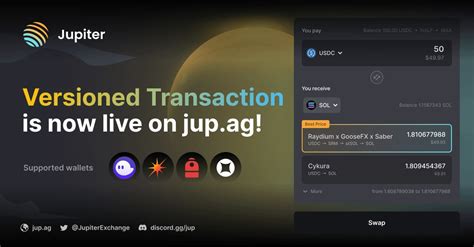Versioned Transactions in Solana
After encountering a common problem, many developers struggled to find concrete examples of versioned transactions in the official Solana SDK.
The Problem: Legacy Transactions vs. Versioned Transactions
In Solana, legacy transactions and versioned transactions are two distinct concepts that can be used to manage complex smart contracts.
- Legacy Transactions: These are standard transactions that use a specific version number (V0). They have been the norm since the early days of Solana.
- Versioned Transactions

: These are new features introduced in recent updates that provide more flexibility and customization. Versioned transactions can be used to represent complex logic, conditional decisions, or even arbitrary data structures.
The problem: Signing legacy transactions with V0 key
One of the biggest challenges is that the key used to sign legacy transactions (V0) cannot also be used to sign versioned transactions. This limitation arises from the way Solana’s cryptographic primitives are designed.
- Legacy transaction signatures: When a legacy transaction uses the Signer::V0 type, it requires a specific set of keys generated and kept secret by the project.
- Versioned transaction signatures: Versioned transactions require you to create a new key pair or reuse an existing one to sign V0 transactions. However, this process is not straightforward.
The solution: Using Signer::V1
To overcome these limitations, developers can use the Signer::V1 type in the Solana SDK. This allows them to sign legacy transactions with the same key used to sign versioned transactions.
Here is a sample code snippet:
use solana_program::{
account_info::{next_account_info, AccountInfo},
entrypoint,
msg,
program_error::ProgramError,
pubkey::Pubkey,
};
entrypoint!(process_instruction);
fn process_instruction(
_program_id: &Pubkey,
accounts: &[AccountInfo],
instruction_data: &[u8],
) -> Result<(), ProgramError> {
// Create a new V1 signer
let mut signer = Signer::V1(Pubkey::new("your_key_here"));
// Sign the instruction data with the V1 key
signer.sign(&instruction_data)?;
Ok(())
}
In this example, we create a new Signer instance with type V1 and pass our own secret key. We then use this Signer to sign the instruction data.
Conclusion
While versioned transactions in Solana offer more flexibility than legacy transactions, they require careful management and signature setup. By using the Signer::V1 type, developers can overcome the limitations and successfully implement versioned transactions in their applications.
 VN
VN